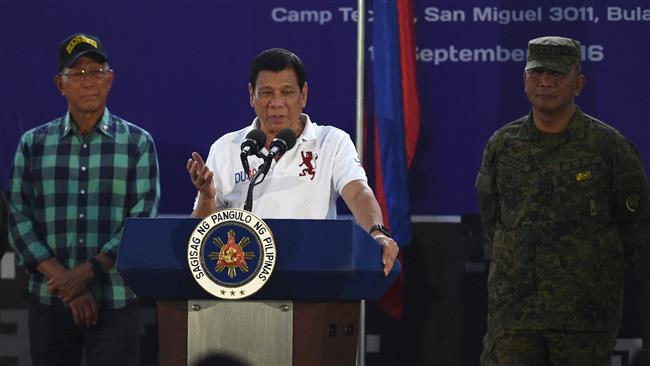-
Tips for becoming a good boxer - November 6, 2020
-
7 expert tips for making your hens night a memorable one - November 6, 2020
-
5 reasons to host your Christmas party on a cruise boat - November 6, 2020
-
What to do when you’re charged with a crime - November 6, 2020
-
Should you get one or multiple dogs? Here’s all you need to know - November 3, 2020
-
A Guide: How to Build Your Very Own Magic Mirror - February 14, 2019
-
Our Top Inspirational Baseball Stars - November 24, 2018
-
Five Tech Tools That Will Help You Turn Your Blog into a Business - November 24, 2018
-
How to Indulge on Vacation without Expanding Your Waist - November 9, 2018
-
5 Strategies for Businesses to Appeal to Today’s Increasingly Mobile-Crazed Customers - November 9, 2018
Philippine President ‘ordered hit-squad’ to kill criminals and opponents
Matobato’s claims, which have not been independently confirmed, linked President Duterte and his son, Paolo Duterte, to a list of crimes worthy of a gangster film.
Advertisement
The witness, Edgar Matobato, spoke to Filipino lawmakers at Senate hearings investigating a recent wave of extra-judicial killings that has claimed more than 3,000 lives as part of the president’s anti-drug campaign.
Matobato told senators Duterte allegedly gave the go-ahead for the summary execution of Senator Leila de Lima, a staunch critic of Duterte.
Presidential sister Jocelyn Duterte also denied Matobato’s statement that the President ordered the killing of a dance instructor who happened to be her ex-boyfriend.
Human rights advocates have previously suggested that other witnesses refused to testify “out of fear of being killed”, the AP notes. “Had you gone further up, we would have killed you because we were already in an ambush position”, he told de Lima at the resumption of the hearing. “It’s good that you left”.
The mass killing of suspected drug dealers in recent months has caused alarm in the Philippines, as well as among United Nations officials and global human rights groups.
Mr Duterte, he alleged, ordered him and others to kill about 1,000 criminals or political rivals over a 25-year period.
Matobato said under oath that the death squad’s “job was to kill criminals like drug pushers, rapists, snatchers”, adding that some were thrown into the sea with their stomachs cut open and their bodies tied to concrete blocks. “We killed people nearly on a daily basis”, Mr. Matobato said.
In his testimony, Matobato accused Duterte’s son Paolo, the incumbent Davao City vice mayor, as also responsible for the killing of several people especially hotelier Richard King in 2013 due to rivalry over a woman.
Philippine President Rodrigo Duterte delivers a speech at an air base in Manila on Tuesday.
At the time of the orders, Duterte was mayor of Davao City, then a chaotic but now a bustling urban center in the Philippines’ south. “All they know was that I work at the Davao City Hall”, said Matobato who said he only finished Grade One.
Other victims were a suspected foreign terrorist, who Matobato said he strangled then chopped into pieces and buried in a quarry in 2002.
He said Duterte ordered a bombing of a Muslim mosque in retaliation to the 1993 bombing of the San Pedro Cathedral here but said there was no casualty since no people was inside the mosque at that time. He testified he hurled a grenade at one mosque but there were no casualties because the attacks were carried out when no one was praying. “Buhay pa naman sila hanggang ngayon (They’re still alive until now)”, said Prospero Nograles.
Matobato also claimed that of the 1,000 people killed, he was personally involved in “executing” at least 50 people as a DDS member that reportedly operated with the “blessings” of Duterte as well as police and other City Hall officials.
De Lima has yet to say why she did not seek to prosecute Duterte over the Davao killings when she was justice minister in the previous administration when Matobato first came to her for protection.
Matobato refuted accusations from one senator, a supporter of the president, that he was put up to testify against Duterte by the opposition party.
On this claim, Mr Duterte’s spokesman, Martin Andanar, said “I don’t think he is capable of giving those orders”.
Advertisement
De Lima agreed with Cayetano and said the Senate would follow the proper process.





























